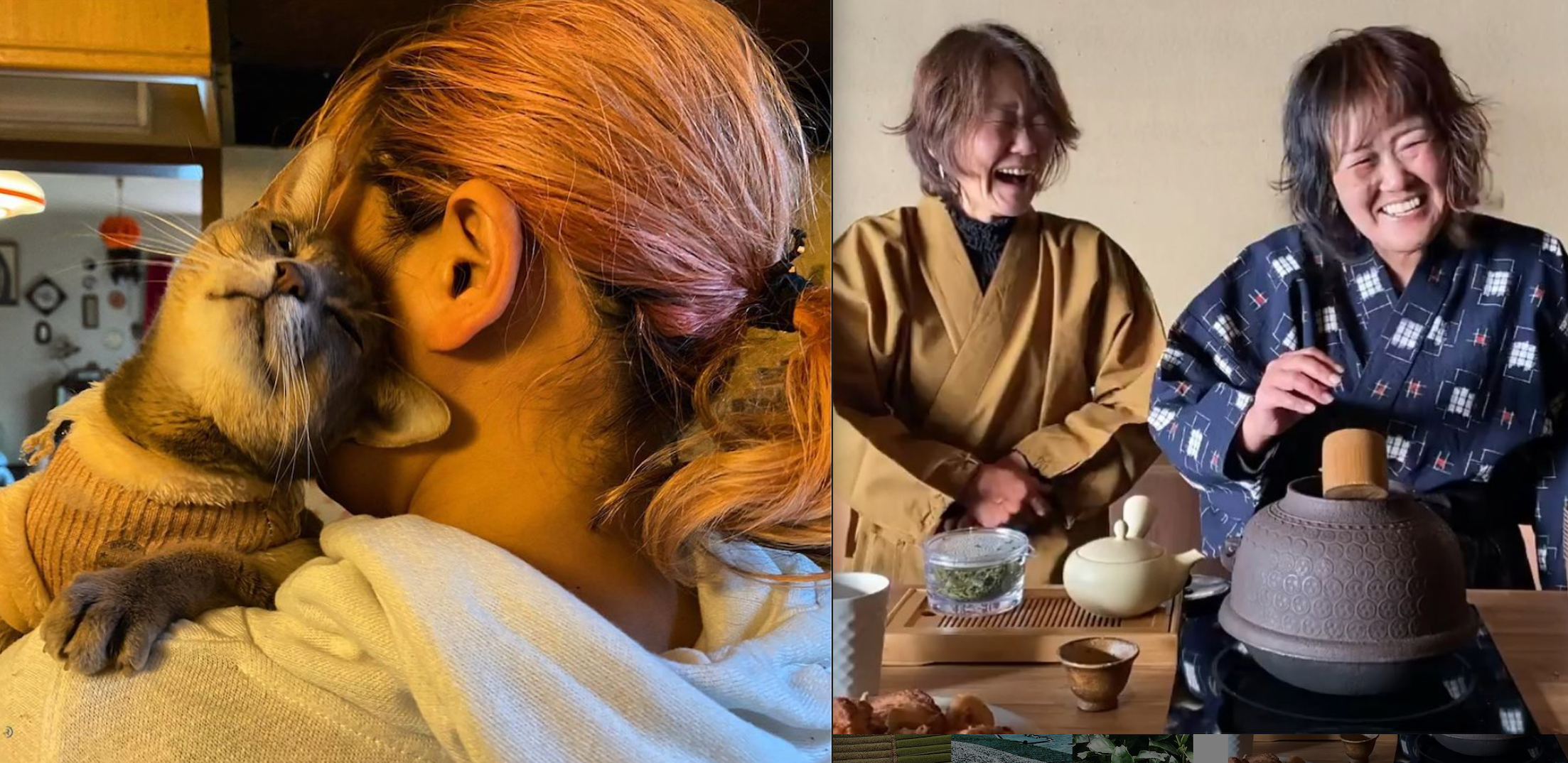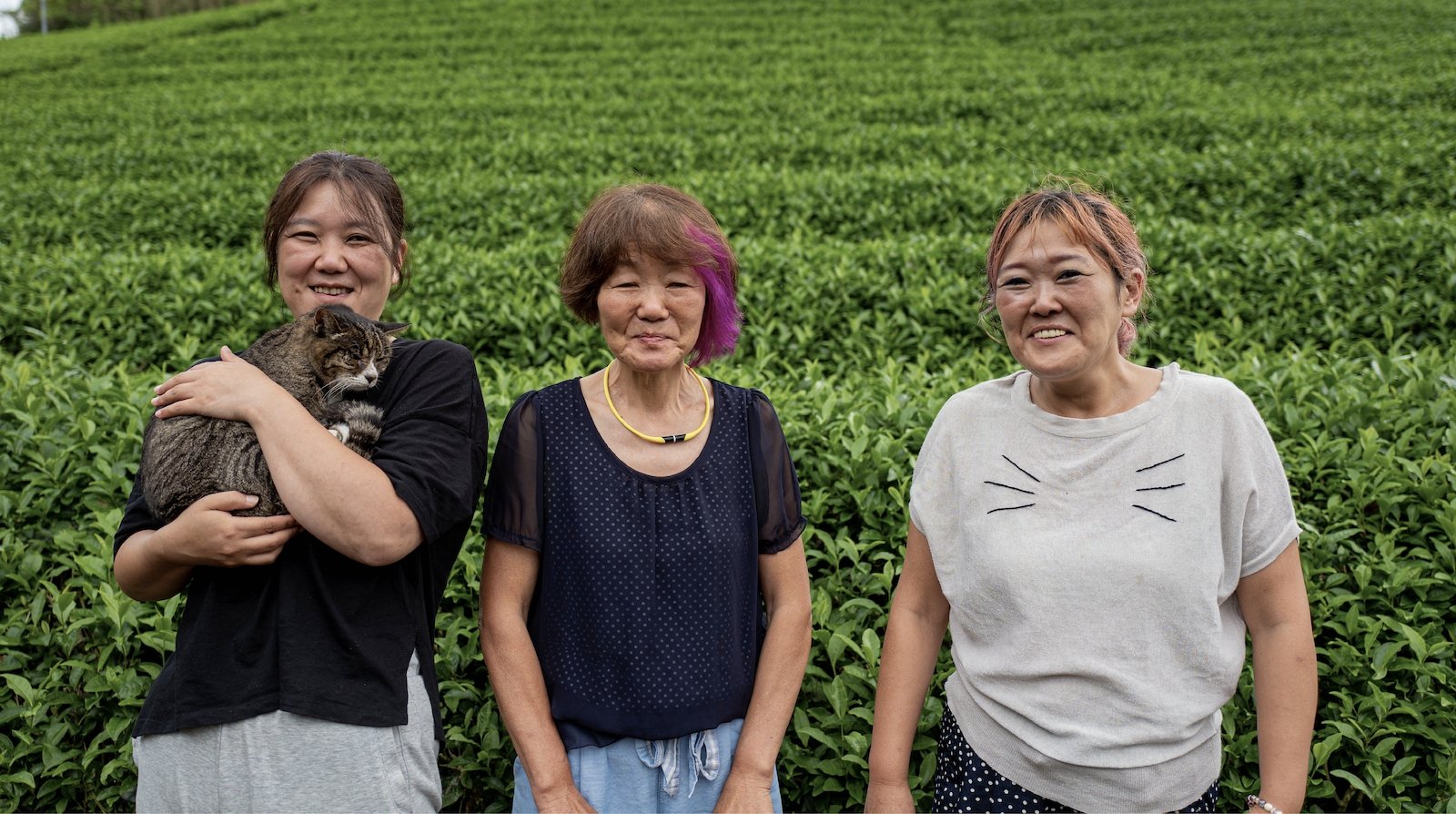今回は、 京都府和束町にある茶園「喜六茶園」の5代目茶農家、堀めぐみさん(通称:うい)へのインタビューをご紹介します。喜六茶園では、お母様の陽子さん、そして妹の弘恵さんと共に、お茶の栽培と加工を行っています。彼らのお茶が特別なのはなぜでしょうか?喜六茶園では、独自の製茶設備と抹茶加工設備を備え、それぞれの茶畑を丁寧に手入れすることで、個性豊かなシングルオリジンのお茶を生み出しています。堀さんは、女性が茶園を経営するのは当然のことだと語りつつも、海外との繋がりや、身近なところでは6匹の猫たちからのサポートや心の支えに感謝していると語りました。日本の茶産業の衰退を懸念する一方で、喜六茶園の女性たちは希少品種の栽培に情熱を注ぎ、それらを使った限定生産の抹茶を製造し、日本茶の世界に新たな活力をもたらしています。
もえ:では、堀さん、今日はお誕生日の日にインタビューを受けてくださってありがとうございます!そして、お誕生日おめでとうございます! Yunomiの「きろく茶園」のページから堀さんの経歴を少しだけ拝見したのですが、具体的にどのような経緯で茶農家になろうと思ったのですか?
堀さん:誕生日のお祝いありがとうございます。茶農家になろうと思ったきっかけについてですが…実は、うちの兄弟はみんな女性なんです。正直に言うと、最初は茶畑の仕事があまり好きじゃなかったんです。というのも、幼い頃からお茶のことしか考えていない両親の姿を見て、お茶のために生きているような気がしたからなんです。だから、私ももっと注目されたかったんだと思います(笑)。でも、親の仕事は自分たち(子供たち)が継がないと誰も継がないんじゃないか、という思いがずっとあったんです。
実は結婚と大阪での仕事でしばらく和束を離れていたんです。繁忙期には大阪から和束に手伝いに行っていたんです。でもそのうち結婚生活が破綻して、気持ちが重くなって。それで茶畑に戻って来たんです。お茶の仕事って、すごく大変な仕事だけど、心は優しいじゃないですか。それで、父が亡くなった時も、また和束の茶畑を手伝っていたんです。そして、一人でできる仕事じゃないから、母と一緒に両親の仕事は継ごうと決めたんです。でも、私が継ごうと決める前に、何人かの男性から「(私が)代わりにやらないか」と誘われたんです。でも、「私にできます」と断りました。それからは、主に二人で仕事を続けています。
 京都府和束町の茶畑で働く喜六茶園の女性たち。
京都府和束町の茶畑で働く喜六茶園の女性たち。
もえ:ということは、きろく茶園では主にあなたとお母さんがいらっしゃるんですか?
堀さん:はい、はい。うちの碾茶工場は、妹が担当しています。普段は別の仕事を持っているのですが、時間がある時は手伝ってくれます。和束町で茶農家が自前の碾茶工場を持つのは珍しいのですが、うちは数少ない家の一つです。これは私たちの伝統なんです。一般的には、多くの茶農家が収穫した茶葉を共同工場に持ち込んで加工するのですが、私たちは収穫から製造まで、すべての工程を自分たちで行っています。まるで子供を育てているような、とても素敵な時間ですね(笑) 。とはいえ、繁忙期は仕事が山積みで、睡眠不足になり、夜中の3時まで起きていることも…。工場を持つということは、健康や心身へのリスクが高まるということですね。ありがたいことに、収穫期にはアルバイトの方に少し手伝ってもらうことができています。
堀さん:はい。この時期は「線路が命」と言います。つまり、茶摘みの時期は、すべての準備が万端でいなければならないということです。茶葉を摘んだら、次の工程へ、そしてまた次の工程へ…。だから「線路は命」と言うんです。パートさんたちの手も増えて、工程がスムーズに進むようになってきています。
Moé:先代の世代と比べて、お茶栽培や農業のやり方はどのように変化しましたか?
堀さん:そうですね、私は口承で聞いた知識しかないので100%確かなことは言えないのですが、当時は皆さんが知っているような機械も車も何もありませんでした。私の曽祖父は森に入ってノコギリを持って木を切り、「開墾」(かいこん;農地を作るために森を切り倒す作業)という作業をしていました。それから土を準備し、穴を掘って茶の木を植えていました。茶園の規模は今よりずっと小さくて、茶園が一つあれば、かなり立派な茶園とされていたと思います。収穫時期になると、手作業かハサミを使って茶葉を摘んでいました。今のような巨大な製茶工場はありませんでした。だから茶農家の中に、茶葉を揉み、加工して製品化する小規模な製茶工場があったんです。
今では機械化が進み、茶園の規模は拡大し、より効率的に収穫できる機械も導入されています。私たち喜六茶園にも自社の碾茶工場はありますが、今では共同工場に茶葉を持ち込み、茶農家の方々が茶葉の揉み、加工、製造を委託するのが一般的です。そこから農協の組合員が市場へ持ち込み、そこで価格が決まる仕組みです。
かつては茶農家は茶を栽培するだけで生計を立てることができましたが、今は少し難しくなっています。そして昨年はコロナ禍で状況が一変しました。茶市場では新茶の価格が下落し、二番茶と同程度の価格になってしまいました。日本の茶業界は大きなプレッシャーを感じており、危機感を感じています。これほど直接的な影響が出るとは思っていませんでした。
 きろく茶園の堀恵美さんとのインタビューをZoomで撮影したスナップショット
きろく茶園の堀恵美さんとのインタビューをZoomで撮影したスナップショット
Moé:はい、コロナは様々な形で(間接的に)影響を与えていますし、今も影響を与え続けています。これは私たちが互いにつながっていることを示しており、新しい常態になっているようですね。でも、特に和束町に関しては、私が訪れた時、若い茶農家の方々がとても熱意を持っていると感じました( おぶぶ茶園の「アッキー」(北明宏)さんのように)。 そして修さん?
堀さん:そうですね、茶農家はほんの数人ですね。高齢化が進んでいる中で、この仕事を担う若い世代が足りないと感じています。私が初めて和束町に来た頃と比べて、人口は半分に減っています…ということは、茶業を継ぐ人はさらに少なくなるということです。10~15年後には、和束町には放置された茶畑がたくさんあるのではないかと危惧しています。残念なことに、今の日本人は世代が変わってきていて、急須ではなくペットボトルでお茶を飲むようになってきています。日本人自身もお茶をあまり大切にしていないように感じます。
これがこの辺りの現実なんです…ペットボトルのお茶は安く買えるし、じゃあうちのお茶みたいな高品質でいいお茶を誰が買ってくれるんだろう?っていうのが、海外の市場の方が希望なんですよね。実は、喜六茶園もSNSのおかげで注目や応援を少しずつもらえるようになってきているんです。例えば、抹茶を点てている写真をアップすると、喜んでくれたり、コメントをくれたりするのは、実は嬉しい驚きなんです(笑)。こういう時だからこそ、すごく心が温かくなるんです。パンデミック以降、海外にも繋がりや友達が増えました。まあ、直接会ったことはないんですけど、みんな私たちの友達なんです。日本ではあまり注目されないんですけど、海外では「女性3人で茶園をやっているから応援したい」って言ってくれる人がたくさんいるんです。
Moé:日本の状況は残念ですが、海外から応援していただいていると聞いて嬉しいです。本当に心強いですね!ところで、キロク茶園の特徴の一つとして、女性3人で茶園を運営しているということが挙げられますか?また、そのことで苦労されたことはありますか?
堀さん:そうですね、それが1番ですね。そして、私たちが直面している課題に関して言えば、実はとてもシンプルです。ええ、基本的に私は背が低くてスタミナもあまりないんです。でも、最終的には何でもできるんです(笑)。
Moé:ああ、確かに心は私たちに何ができるか、何ができないかという制限を設けてしまう傾向があるんですね…。残念ながら、まだ喜六茶園のお茶については詳しくないのですが、あなたの茶園を象徴するお茶、あるいは特におすすめしたいお茶はありますか?
堀さん:朝乃香という品種があります。鹿児島原産の品種(枕崎研究所で育成、1996年登録)で、やぶきたと中国原産の品種を掛け合わせたものです。和束町で朝乃香を栽培したのは、私たちの茶園が初めてです。今は煎茶用の品種なので、朝乃香を栽培して煎茶を作っている方は他にもいらっしゃると思いますが、私たちの茶園では朝乃香を使って抹茶を作っています。全国的に見ても、朝乃香抹茶を作っているところは他にあるのかな…ちょっと分かりません!そういう意味では、かなり珍しいかもしれませんね。なので、私たちの看板商品と言えるでしょう。抹茶として(点てると)とてもいい泡立ちで、ベルベットのような滑らかさとフルーティーな香りが楽しめます。そうそう、今年はお客様と一緒に新しい試みをしてみました。7種類の茶葉を使った抹茶を淹れてみました。そして、アンケートと一緒に抹茶のサンプルをお送りし、どのお茶が一番気に入ったのかを把握し、ご意見を伺うことにしました。
[鐘の音]
Moé:すみません、うちの猫が一人で遊んでいるんです…この時間(中央ヨーロッパ時間の午前6時30分頃)に起きているのは彼女だけなんです。
堀さん:猫は6匹いるんですが…
萌え:わぁ、 6個って、結構多いですね!
堀さん:みんな本当に可愛いですね。私は猫派なので、本当に大好きです!(堀さんが猫を一人ずつ連れてくる)この子は柚子。うちの猫たちはみんな和菓子にちなんで名前がつけられていて、きなこ、あんこ、ドラ(どら焼きにちなんで)、もなか、柚子…お母さんはマイクという名前です。みんなお茶猫なんです。インスタグラムにも時々登場します。茶畑仕事で疲れた時は、まるでセラピーのようです。

萌:うーん、お昼寝と休息の大切さに関しては、うちの猫が一番の先生なんです。猫のこと、もっと聞きたいんですけど(笑)、お茶の話に戻りましょう。茶園の栽培システムで何か特別なことをしているんですか?
堀さん:そうですね、喜六茶園では特に特別なことはしていませんが、茶樹にかかる負担を最小限に抑えるよう配慮しています。二番茶の収穫時には、必ずローテーションを行います。つまり、2~3年に一度、茶樹を休ませるために「中刈り」と呼ばれる作業を行い、茶樹の一部を深く刈り込みます。
それに、母は何事にもとても几帳面な性格で、少しでも茶樹に負担をかけてしまうと、すぐに怒られてしまいます。母は茶畑のあらゆる工程に本当に心をこめて取り組んでいて、雑草取りまで細心の注意を払って作業を進めます。 堀さんのお母さんは、喜六茶園のモデルとなっている。
堀さんのお母さんは、喜六茶園のモデルとなっている。
もえ:ああ、草むしりダンス!2019年の夏、和束で関わった仕事の多くは草むしりでした。でも、もしお母さんのようにもっと気持ちを込めてやっていたら、また違った結果になったかもしれませんね。お茶畑で、好きな作業や好きな季節はありますか?
堀さん:私は収穫期が一番好きなんです。仕事は山積みですが、新しいパートさんも農園を手伝ってくれるので、春の爽やかな風が吹いているような、新しいエネルギーが湧いてきます。それ以外の時期は、母と一緒に寒い日も暑い日も蒸し暑い日も、毎日コツコツと働いています。そうそう、去年はアメリカ人の女の子が2~3ヶ月インターンとして来ていました。 国際日本茶協会を通じて知り合い、シモーナさんが紹介してくれたんです。外国人の方でも日本茶に深い情熱を持って、茶農家の仕事に興味を持ってくれる人がいるのは素晴らしいことだと思います。英語が話せたらもっといいんですけどね(笑)。でも、全然話せないんです。
萌え:私もフランスでは言葉の壁に苦労しました。でも、日本にいるんだから大丈夫。ボディランゲージでコミュニケーションをとったり、観察しながら話を聞いたり、そういう風にお茶のお仕事もできるじゃないですか。彼女は日本語を話せましたか?
堀さん:はい、彼女は英語教師として日本に来たので、少しは話せました。でも、コミュニケーションに多少の課題はありました。それでも彼女はきちんと仕事をこなし、私も拙い英語で精一杯頑張りました(笑)。ですから、私たちにとってとても良い経験になりました。コロナが落ち着いたら、私も同じようなことをできたらいいなと思っています。日本の茶園の荒廃と茶産業の将来について、本当に心配しています。和束町の人々だけでは十分ではありません。和束町以外の人々と言うのは、もしかしたら彼らの方がもっと熱意を持っているかもしれないからです。しかし、当面は、パンデミックという直近の課題があっても、ここで仕事を続けます。長年の努力の後、家族がこれほどの愛情とエネルギーを注いできたものを手放すのは辛いです。
萌:お茶への情熱と情熱に深く敬意を表します。もしかしたら、近い将来、廃茶畑から新たな出会いや繋がりが生まれるかもしれませんね。どうなるか楽しみです。さて、本日は貴重なお時間をいただき、改めて感謝申し上げます。きろく茶園を支える女性たちについて、より深く知ることができ、大変光栄でした。最後に、 Yunomiのお客様、あるいはきろく茶園のお茶を飲んでくださる方々に何か伝えたいことはありますか?あるいは、他に何かお話したいことがあれば、ぜひお聞かせください。
堀さん:いつもお茶と抹茶を飲んでくださりありがとうございます。YunomiとInstagramのおかげで、世界中にたくさんの友達ができました。そして、もっと日本茶を飲んでほしいですね(笑)。そして、少しでも関心を持ってもらえたら、世界中の人が協力してくれて、茶園が荒廃することなく、豊かに育っていくのが私の夢です。ぜひ、喜六茶園にお越しください。お会いできたら嬉しいです!
 左から右へ:堀さんとピンクのハイライト、母娘。堀さんのグラフィックアートのバックグラウンドのおかげで、きろく茶園は洗練されたウェブサイトとインスタグラムアカウントを運営しており、美しい茶園の写真が多数掲載されています。もしあなたが猫好きであれば、それはさらに嬉しい特典です!
左から右へ:堀さんとピンクのハイライト、母娘。堀さんのグラフィックアートのバックグラウンドのおかげで、きろく茶園は洗練されたウェブサイトとインスタグラムアカウントを運営しており、美しい茶園の写真が多数掲載されています。もしあなたが猫好きであれば、それはさらに嬉しい特典です!
インタビューの最後に、堀さんはピンクのハイライトを入れた髪を見せてくれました。この色を入れることで、茶畑を歩く時の元気が湧いてくるのだそうです。堀さんのお母様も紫の髪色を入れるのがお好きとのこと。堀さんは誕生日に特別なことは何もしていないとのことでしたが、この日に立ち会えたことをとても嬉しく思いました。
注:このインタビューは、茶園の閑散期である2021年1月19日に日本語で行われました。現在、女性たちは茶樹の手入れと管理に忙しく、最初の摘み取りシーズンに向けて準備を進めています。このブログ記事の写真はすべて、 きろく茶園から提供されたものです。特集写真では、左から姉の弘恵さん、母の陽子さん、そして宇衣さんの3人が茶園の前に並んでいます。



2件のコメント
Hello,I have come across your website because I am looking for the best matcha from Japan. I am very interested in adding your products to our range. I would also be open to generating my own branding. I would definitely like to add the following products to our range: Matcha, Hojicha and the products for preparation. (Bamboo whisks, etc.) I look forward to hearing from you. Best regards from Switzerland Martina Bernet
Very wonderful article. Best of luck!